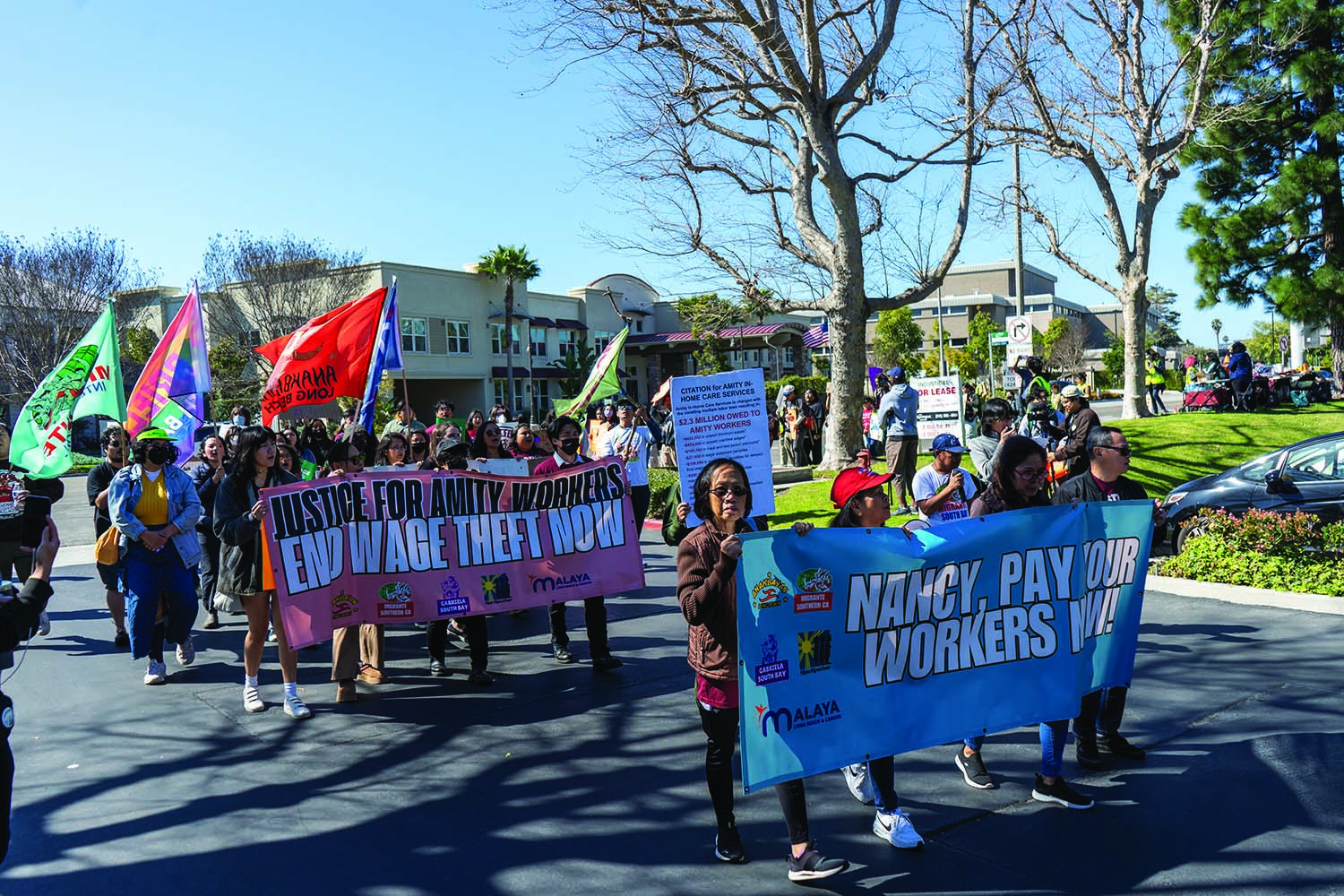Community supporters and advocacy groups rallied in late February against a Torrance-based caregiving agency that has been ordered to pay $2.2 million in unpaid wages to dozens of Filipino home care workers
California’s labor commissioner ordered Amity In-Home Care Services to pay $2.2 million in unpaid wages
By Klarize Medenilla/AJPress
The California Labor Commissioner’s Office has ordered a Torrance-based caregiving agency to pay $2.2 million in unpaid wages to dozens of Filipino home care workers in the South Bay Area of Los Angeles County, according to a Feb. 20 citation.
To celebrate this long-awaited victory for the dozens of affected workers, the Filipino Migrant Center and other allied workers’ advocacy groups organized a rally on Feb. 24 outside the headquarters of Amity In-Home Care Services.
“We’re here to uplift the efforts of the caregivers [who worked for Amity In-Home Care Services], whose brave fight against wage theft and labor exploitation has culminated in a monumental investigation and outcome in this case,” said Romeo Hebron, executive director of the Filipino Migrant Center.
According to the Feb. 20 citation, Amity misclassified its agency’s caregivers “as independent contractors.” California Labor Commissioner Lilia Garcia-Brower said, “Misclassifying workers is not a simple paperwork error. It is a deliberate violation of the law that denies employees earned wages, protections and benefits they are legally owed and entitled to.”
Additionally, Amity had also violated several labor laws, including refusing to: pay for overtime, provide workers’ compensation insurance and give the proper wage statements to the workers.
The total citation, including interest and other penalties, amount ran up to $2,327,2577, with about $2.2 million that will be paid to the misclassified caregivers.
The citation followed a years-long investigation into dozens of complaints from at least 50 workers who began filing formal complaints against Amity in 2019.
According to its website, Amity In-Home Care Services serves as “a non-medical service home care agency” that provides “assistance and custodial care” to patients. (Amity has not responded to requests for comment on this story.)

Amity CEO Linda Reyes, who is also Filipino, was at the center of many of their workers’ complaints.
Precy Tanuyan, a former Amity employee who worked with the agency for three years, shared that she was supposed to be paid twice a month, but either she would not receive her check or the check would bounce.
Tanuyan said, “I would have to call Nancy and tell her I have to pay for my house and other bills, but she would make up excuses and make me run around to get my check. While workers like me were suffering, Nancy had multiple other businesses and appeared to be living a life of luxury.”
In 2023, Bet Tzedek Legal Services got involved in the case which led to a state inspection of Amity’s headquarters. The state then issued a stop order, because of the company’s refusal to provide workers’ compensation insurance, the Labor Commissioner’s Office said in a statement.
Among those affected include Alma Bernal, a Filipina caregiver who worked for Amity between 2019 and 2022. Bernal shared her story at the Feb. 24 rally, stating that Amity would not pay her on time, which caused her “anxiety from worrying” to the point where she needed “medication due to [her] high blood pressure.”
Once she got in touch with the Filipino Migrant Center, she learned about workers’ rights and much of Amity’s treatment of its workers was not only abnormal but illegal.
The state’s investigation into Amity found that employees frequently worked more than 12-hour work shifts—sometimes 24-hour shifts—without a break or overtime pay. Bernal also shared that her paychecks would regularly bounce “due to insufficient funds,” a common occurrence among Amity’s employees.
This citation, seen as a win for workers’ rights, is somewhat of a rarity in California, a state that had a 47,000-case pileup in 2024 (according to an audit of the Labor Commissioner’s Office). Labor disputes such as this often take even longer, if they are ever investigated.
Filipino Migrant Center stated that in-home caregiving positions—which are often filled by undocumented immigrants and non-English speakers—are especially at risk for exploitation. As previously reported in the Asian Journal, many of these workers are often isolated and dependent on their employers who deprive them of their rights and wages.
“The citation against Amity and Nancy is a victory for the workers and community to hold Nancy and Amity accountable and for justice to be brought to the workers,” Bernal said at the rally. “We want the suffering and exploitation of the workers to end. To all the workers like me who were victimized by Nancy Reyes of Amity and other agencies, don’t be afraid to stand up and fight back!”







